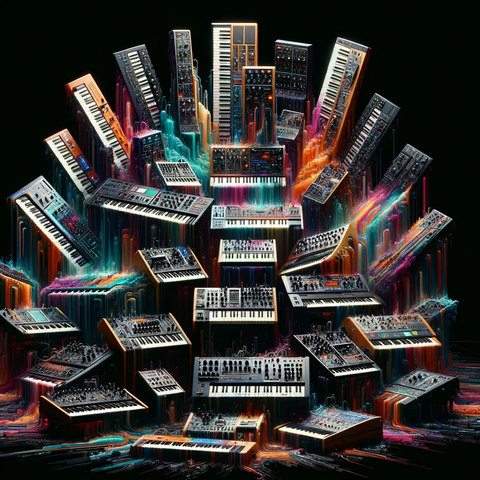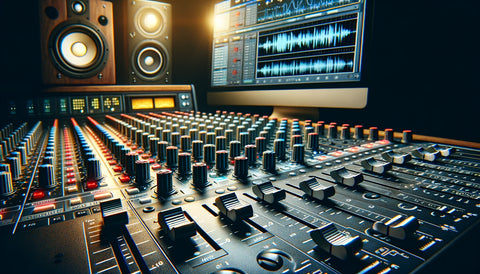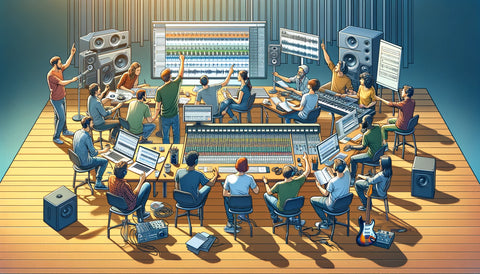
The Ultimate Guide to Elevating Your Music Production: Tips and Tricks for 2024
Share
- Introduction to Music Production Elevation - Covering the importance of constant improvement and the benefits it brings to your music.
- Upgrading Your Studio Equipment - Discussing how the right tools can make a huge difference in sound quality and production efficiency.
- Advanced Production Techniques - Exploring sophisticated techniques that can transform your tracks from good to great.
- The Role of Mixing and Mastering - Understanding the critical final steps in music production to ensure your tracks are ready for the audience.
- Continuing Education and Collaboration - Highlighting the importance of learning new skills and working with others to push your boundaries.

1. Introduction to Music Production Elevation
In an era where music production has become increasingly accessible to everyone, standing out in a sea of talented producers requires not just creativity but also a dedication to continuously elevating your craft. The journey of a music producer is filled with endless learning, adapting, and innovating. Whether you're a bedroom producer aspiring to make it big or a seasoned professional looking to stay ahead of the curve, the importance of elevating your music production cannot be overstated.
The landscape of music production is ever-evolving. With advancements in technology, new software, and equipment, the tools at our disposal are more powerful than ever. However, having the best tools is just part of the equation. Knowing how to effectively utilize these tools to enhance your sound, streamline your workflow, and bring your creative visions to life is what truly sets the exceptional producers apart from the rest.
Elevating your music production is not merely about upgrading your equipment or learning the latest software. It's about cultivating a mindset of growth, embracing new techniques, and understanding the subtleties that turn a good track into a masterpiece. It involves a deep dive into the nuances of sound design, arrangement, mixing, and mastering, as well as the softer skills of creativity, collaboration, and patience.
This guide aims to provide you with actionable tips and insights to push your music production to new heights. From upgrading your studio equipment to mastering advanced production techniques and understanding the critical role of mixing and mastering, we'll cover the essential aspects that every producer needs to know. Furthermore, we'll explore the significance of continuing education and collaboration in your music production journey.
Join us as we embark on this journey to elevate your music production, ensuring your tracks not only sound professional but also resonate deeply with your audience. The path to becoming a standout music producer is both challenging and rewarding, and it all begins with the commitment to never stop learning and growing.

2. Upgrading Your Studio Equipment
In the quest to elevate your music production, the significance of having the right tools cannot be overstated. Upgrading your studio equipment is a pivotal step towards achieving professional-quality sound and efficiency in your workflow. This section explores the essential upgrades that can transform your music production studio into a powerhouse of creativity and innovation.
Selecting High-Quality Studio Monitors
The choice of studio monitors can dramatically affect your ability to make informed mixing decisions. High-quality monitors offer flat frequency response, ensuring that your mixes translate well across various listening environments. Investing in monitors that provide clear, unbiased sound reproduction will empower you to craft mixes that sound great on headphones, car stereos, and club sound systems alike.
The Heart of Your Studio: The Audio Interface
The audio interface is the heart of your music production setup, acting as the bridge between your instruments, microphones, and computer. An upgrade to a high-end audio interface can significantly improve the fidelity of your recordings. Look for interfaces with high-quality preamps, low-latency performance, and ample connectivity options to accommodate your growing studio needs.
Synthesizers and Sound Modules
Synthesizers and sound modules offer a world of creativity, allowing producers to design unique sounds that set their music apart. Whether analog or digital, a well-chosen synthesizer can be the source of inspiration for new tracks. Modern synthesizers combine the warmth of analog circuits with the precision of digital control, providing an expansive palette of sounds to explore.
Software and Plugins: Expanding Your Creative Toolbox
The software you choose, including DAWs and plugins, plays a crucial role in your music production process. Upgrading to professional-grade software can unlock advanced features, such as superior mixing tools, more intricate sound design capabilities, and a broader range of virtual instruments. Regularly updating your plugins and exploring new software can introduce fresh sounds and techniques to your productions.
Ergonomics and Studio Layout
Lastly, never underestimate the importance of a comfortable and well-organized studio space. Upgrading your studio furniture to ensure ergonomics can enhance your productivity and help prevent fatigue during long sessions. Consider the layout of your studio equipment, ensuring everything is within easy reach and that your studio is a place where you feel inspired to create.
By thoughtfully upgrading your studio equipment, you're not just investing in gear but in your future as a music producer. Each piece of equipment, whether it's a new set of studio monitors or a cutting-edge synthesizer, brings you one step closer to realizing the full potential of your music. Remember, the goal is to create a studio that not only meets your current needs but also anticipates the growth of your craft.

3. Advanced Production Techniques
Elevating your music production entails not just having the best equipment but also mastering the techniques that allow you to utilize that equipment to its full potential. Advanced production techniques can transform your tracks, giving them a professional edge that stands out in today's competitive music scene. This segment dives into some of these techniques that can help take your productions to the next level.
Layering Sounds for Depth and Complexity
One of the hallmarks of a well-produced track is the depth and complexity of its sound. Achieving this often involves layering multiple elements, such as synths, basslines, and percussion. By carefully selecting sounds that complement each other and adjusting their volume, panning, and EQ, you can create rich, textured tracks that engage listeners.
The Art of Sidechain Compression
Sidechain compression is a technique used to create a pumping effect, most commonly heard in electronic dance music. However, its utility extends beyond just a stylistic effect. When applied subtly, it can help create space in your mix by allowing certain elements, like a kick drum, to cut through more prominently, thereby ensuring that your track has a dynamic and balanced mix.
Creative Use of Effects and Automation
Effects such as reverb, delay, distortion, and modulation can dramatically alter the character of your sound. Automation allows you to change these effects over time, adding movement and interest to your tracks. Experimenting with unconventional effects chains and automating parameters like filter cutoffs, effect wet/dry levels, and panning can result in a sound that keeps your listeners engaged from start to finish.
Advanced Sampling Techniques
Sampling isn’t just about using pre-recorded sounds; it's a creative tool that can be used in myriad ways. From chopping and screwing samples to creating entirely new instruments from a single sound, advanced sampling techniques allow producers to craft unique sounds that set their music apart.
Mixing and Mastering Skills
While often considered separate from production, advanced mixing and mastering skills are crucial for producing professional-quality music. Understanding how to balance your mix, use EQ effectively, and apply compression and limiting can make the difference between a good track and a great one.
Embracing these advanced production techniques not only enhances the quality of your music but also expands your creative possibilities. The journey of a music producer is one of constant learning and experimentation. By incorporating these techniques into your workflow, you'll not only improve your productions but also find new ways to express your musical ideas.

4. The Role of Mixing and Mastering
After the creative process of composing, arranging, and recording comes the critical phase of mixing and mastering. This stage is where your music is polished and prepared for public listening. It's a meticulous process that requires a fine ear and a deep understanding of sound dynamics. This section outlines the importance of mixing and mastering and provides insights into how they can elevate your music production.
The Magic of Mixing
Mixing is the art of blending all the individual tracks in a session to create a cohesive song. It involves adjusting levels, panning, and applying EQ, compression, and effects to each element. The goal is to ensure that all parts of the song work together harmoniously, without any one element overpowering the others. A well-mixed track brings out the best in your music, highlighting the key components and ensuring clarity across the frequency spectrum.
Mastering: The Final Polish
Mastering is the final step in the music production process, preparing the track for distribution. It involves fine-tuning the mix's overall sound, ensuring consistent loudness levels, enhancing clarity, and making sure the music sounds great on all playback systems. Mastering also includes sequencing the tracks for an album, ensuring there's a cohesive flow from start to finish. It's the last opportunity to make adjustments before your music is released to the world.
The Technicalities and Creativities
While mixing and mastering are highly technical, they also require creative decision-making. Deciding how much reverb to add, the width of the stereo image, or the intensity of compression are all creative choices that affect the final sound. The balance between technical precision and creative intuition is what makes mixing and mastering both challenging and rewarding.
Learning and Outsourcing
For many producers, mixing and mastering can seem daunting. It's a skill set that takes years to develop, requiring a deep understanding of sound physics and auditory perception. While it's beneficial for producers to learn the basics, outsourcing these tasks to professionals can sometimes be the best option, especially when looking for radio-ready quality.
The Ever-Evolving Landscape
The techniques and technologies used in mixing and mastering are constantly evolving. Staying updated with the latest trends, tools, and techniques is crucial. Whether it's the use of analog gear for warmth or the latest digital plugins for precision, the choices you make in this phase can significantly impact the quality and competitiveness of your music.
Mixing and mastering are where your music comes to life, where all the pieces come together to form a complete, polished product. By understanding and respecting the importance of this stage, you ensure that your music is not just heard but felt.

5. Continuing Education and Collaboration
The final, yet perpetual, stage in elevating your music production is rooted in the principles of lifelong learning and collaboration. The music industry is dynamic, with new technologies, techniques, and genres emerging constantly. Staying at the forefront of these changes not only requires a commitment to continuous education but also an openness to collaborate with others. This section delves into why these elements are crucial for growth and innovation in music production.
Embracing Lifelong Learning
The landscape of music production is vast and ever-evolving. Producers who dedicate themselves to continuous learning keep their skills sharp and stay ahead of industry trends. This can be through formal education, such as courses and workshops, or through self-guided learning, like online tutorials and reading. Embracing a variety of learning resources can introduce new perspectives and techniques, inspiring creativity and pushing the boundaries of what's possible in music production.
The Power of Collaboration
Collaboration is a cornerstone of music production. Working with other musicians, producers, and audio engineers opens up a world of creative possibilities. It allows for the exchange of ideas, sharing of skills, and blending of styles, leading to innovative and unique music creations. Collaboration also fosters a sense of community and support, providing a network of peers who share your passion and understand your challenges.
Networking and Mentorship
Building relationships within the music industry can lead to mentorship opportunities, collaborations, and even career advancements. Networking, both online and in person, helps you connect with like-minded individuals who can offer guidance, feedback, and support. Mentorship from more experienced industry professionals can be invaluable, providing insights into the business aspects of music production, as well as technical advice.
The Role of Feedback
Receiving and giving feedback is an essential part of the learning process. Constructive criticism from peers and mentors can highlight areas for improvement and introduce new ways of thinking. Similarly, offering feedback to others can refine your critical listening skills and deepen your understanding of music production.
Fostering a Culture of Innovation
When education and collaboration are prioritized, they create an environment where innovation thrives. By continuously learning and working with others, producers can challenge conventional thinking and explore uncharted territories in music production. This culture of innovation not only benefits individual producers but also contributes to the advancement of the music industry as a whole.
In conclusion, elevating your music production is a journey that extends beyond the confines of your studio. It's about embracing the opportunities for growth that come through education and collaboration. By staying curious, open to new ideas, and connected with the music production community, you set the stage for endless creative possibilities and the continual elevation of your craft.
